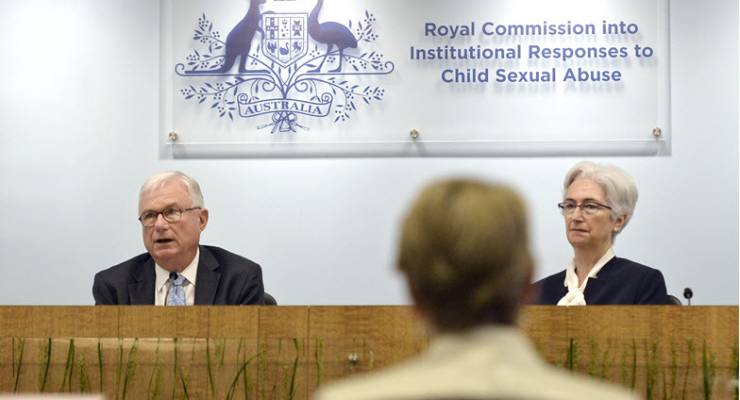
Following last year’s recommendations by the Royal Commission into Child Sexual Abuse, the federal government has announced its support for a national redress scheme, and is in the process of drafting the legislation.
This might seem like an opportune moment of rare governmental good will. Yet while the scheme is due to open in July 2018, there has been little fanfare or positive public reception.
It has attracted criticism from survivor groups and state governments, citing the potential to re-traumatise survivors, and questioning if exclusionary clauses may deny certain survivors — such as children abused while in detention or those victims who went on to become sex offenders — from accessing the scheme in the first place.
As in any financial scheme, the devil is in the detail. Crikey takes a closer look at what the federal government is putting on the table.
How much can survivors claim?
The maximum amount survivors might claim is $150,000, far below the $200,000 recommended by the royal commission.
However, this is not an equitable payment — any application is subject to a complex financial matrix based on the nature of the sexual abuse in question. The claims of sexual abuse survivors will be scrutinised and valued monetarily.
Putting a price on trauma and abuse may potentially cause unnecessary harm to survivors, the antithesis of what redress is supposed to achieve.
Who is responsible for the payments?
The proposed redress scheme is to be “opt in” for both state governments and responsible institutions.
Currently, no states have provisionally agreed to opt-in, with South Australia stating comprehensively that they will not.
Few religious organisations have showed support for the scheme as well.
This means that, should the scheme open in July 2018 as planned, under the current arrangement the vast majority of survivors will be excluded. For example, if a survivor was sexually abused in a Catholic institution in Ballarat — and neither the Victorian government nor the Catholic Church have opted in — then that person will remain ineligible for the scheme. The Commonwealth will not make up the shortfall.
What is the process for victims?
Should the relevant institutions opt-in, survivors will have to navigate a number of hurdles and exclusions.
The redress may exclude survivors convicted of certain criminal offenses or those who have been sentenced to five years jail or longer.
This exclusion was intended to instil “public confidence” in the scheme, by ensuring people convicted of offences such as fraud, drug and sexual assault would not receive a government payout.
Given that childhood sexual abuse can be a contributing cause for adult offending, this provision may explicitly exclude the damage that the redress is meant to address.
How are Aboriginal and Torres Strait Islander people affected?
Aboriginal and Torres Strait Islander people made up around 14% of survivors contacting the royal commission. Yet despite this over-representation, there are many barriers that may prevent them from accessing the scheme.
As well as potential challenges of language, literacy and remote access, there are the hurdles of the administrative process itself.
For example, applicants will have a 90-day period in which to accept any offer of financial redress. Such a slim window will mean that those living in remote communities may not have the opportunity to seek legal advice prior to accepting the offer.
From an even more practical standpoint, in areas where populations are often transient, applicants may not even receive their correspondence and have the time to reply in the first instance.
After the 90-day period expires, the offer is taken off the table which seems to be an unnecessary and potentially punitive administrative stricture.
What would a better system look like?
Any redress scheme that seeks to address the traumatic impacts of child sexual abuse should at its core be a therapeutic and inclusive process. The proposed model seems to be the inverse of that, which may explain why it remains unattractive to various institutions.
Ultimately, the Commonwealth government would do well to consider the feedback from community survivor groups, and formulate a scheme that will contribute to the healing of survivors.
The Commonwealth would also do well to fund and work in partnership with community legal and health services to ensure that the most vulnerable people in our community can be well supported throughout the process.
If you or someone you know is impacted by sexual assault, domestic or family violence, call 1800RESPECT on 1800 737 732 or visit 1800RESPECT.org.au. In an emergency, call 000.







Read my articles for a proper treatment of the failures of the NRS. There are far more issues that concern victims than those you have mentioned.
https://kelsolawyers.com/au/news-item/lawyer-slams-national-redress-scheme/
https://kelsolawyers.com/au/news-item/boycott-mr-turnbulls-redress-scheme/
Would it not be possible to re-appoint the Royal Commissioners to administer the funds to the victims of abuse. After all they are totally familiar with what has happened to these poor souls and the absolute indifference of the institutions to their crimes. Further, should the churches refuse to take part in a meaningful way they should lose their tax-free status and the funds received from this used as compensation
The Catholic church should be told opt in and pay up or lose your status and contribute via taxes. Scum.
Yeah, nah, I’d rather they paid up and lost the tax free status.
Amen to that.
The so called Child Sexual Abuse Redress Scheme is an ill thought out program that will achieve nothing but to put survivors through more terror and trauma than anybody deserves.
Just how do you scrutinize abuse in order to place upon it a monetary value? Disgusting.